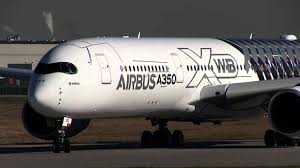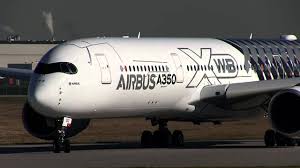
The new A350 XWB line of jets developed by Airbus with an investment of $15 billion is designed to mitigate jet lag, the company claims, apart from being lighter, more fuel-efficient, and more aerodynamically engineered than previous generations of commercial aircraft.
As part of the Qatar Airways fleet, the planes have debuted earlier this year and have now landed in the US.
The A350 XWB boasts a few key innovations that target the disagreeable consequences of long flights, from new lighting systems to different construction materials. However the company does claim that complete elimination of jet lag is not possible.
Trying to take control of the body’s natural sleep-wake cycle, which corresponds to sunrise and sunset is one strategy aimed to lessen jet lag from the outset.
Melatonin, a hormone that makes you feel tired is produced by the body only in traces during the day. As light diminishes, melatonin rises. This body rhythm is thrown out of whack when you’re enclosed in a plane and crossing multiple time zones and results in jet lags. To reduce this the A350 XWB is outfitted with LED lighting that changes color temperature during the flight to imitate the normal shifts of sunlight.
The system is capable of producing 16.7 million different light color combinations that can be set for any flight length or change of time zones, says a spokesperson for Airbus. This changing of light helps the body to sync faster with your destination in the compressed timeframe of the flight. According to the company, for long journeys like flying back and forth among the US, Asia, and Europe, which is where Qatar Airways’ fleet of A350s currently travels, this makes a difference.
There have been some research reports that claim that the ill-effects of jet lag are worsened by changes in pressure and low humidity. The new technologies in the A350 XWB have ways to reduce these problems as well.
Lightweight carbon fiber-reinforced plastic which is strong yet lightweight comprises 53% of the jet’s frame. This combination results in lesser corrosion than aluminum, the traditional material of airplanes and that attribute means moisture is less problematic. More humidity in the air can be allowed as the plane can be pressurized to 6,000 feet due to the nature of the material. This also allows the pressure to be closer to the pressure on the ground than the 8,000-feet that Airbus says is typical in most planes.
The air in the plane is turned over every two to three minutes by the air filtration system in the plane. Though this feature doesn’t target jet lag, per se, but it improves air quality, which can help the passenger sleep a little better, says the Airbus spokesperson. Anything that does that can help a bit as well.
(Source:www.qz.com)
As part of the Qatar Airways fleet, the planes have debuted earlier this year and have now landed in the US.
The A350 XWB boasts a few key innovations that target the disagreeable consequences of long flights, from new lighting systems to different construction materials. However the company does claim that complete elimination of jet lag is not possible.
Trying to take control of the body’s natural sleep-wake cycle, which corresponds to sunrise and sunset is one strategy aimed to lessen jet lag from the outset.
Melatonin, a hormone that makes you feel tired is produced by the body only in traces during the day. As light diminishes, melatonin rises. This body rhythm is thrown out of whack when you’re enclosed in a plane and crossing multiple time zones and results in jet lags. To reduce this the A350 XWB is outfitted with LED lighting that changes color temperature during the flight to imitate the normal shifts of sunlight.
The system is capable of producing 16.7 million different light color combinations that can be set for any flight length or change of time zones, says a spokesperson for Airbus. This changing of light helps the body to sync faster with your destination in the compressed timeframe of the flight. According to the company, for long journeys like flying back and forth among the US, Asia, and Europe, which is where Qatar Airways’ fleet of A350s currently travels, this makes a difference.
There have been some research reports that claim that the ill-effects of jet lag are worsened by changes in pressure and low humidity. The new technologies in the A350 XWB have ways to reduce these problems as well.
Lightweight carbon fiber-reinforced plastic which is strong yet lightweight comprises 53% of the jet’s frame. This combination results in lesser corrosion than aluminum, the traditional material of airplanes and that attribute means moisture is less problematic. More humidity in the air can be allowed as the plane can be pressurized to 6,000 feet due to the nature of the material. This also allows the pressure to be closer to the pressure on the ground than the 8,000-feet that Airbus says is typical in most planes.
The air in the plane is turned over every two to three minutes by the air filtration system in the plane. Though this feature doesn’t target jet lag, per se, but it improves air quality, which can help the passenger sleep a little better, says the Airbus spokesperson. Anything that does that can help a bit as well.
(Source:www.qz.com)





